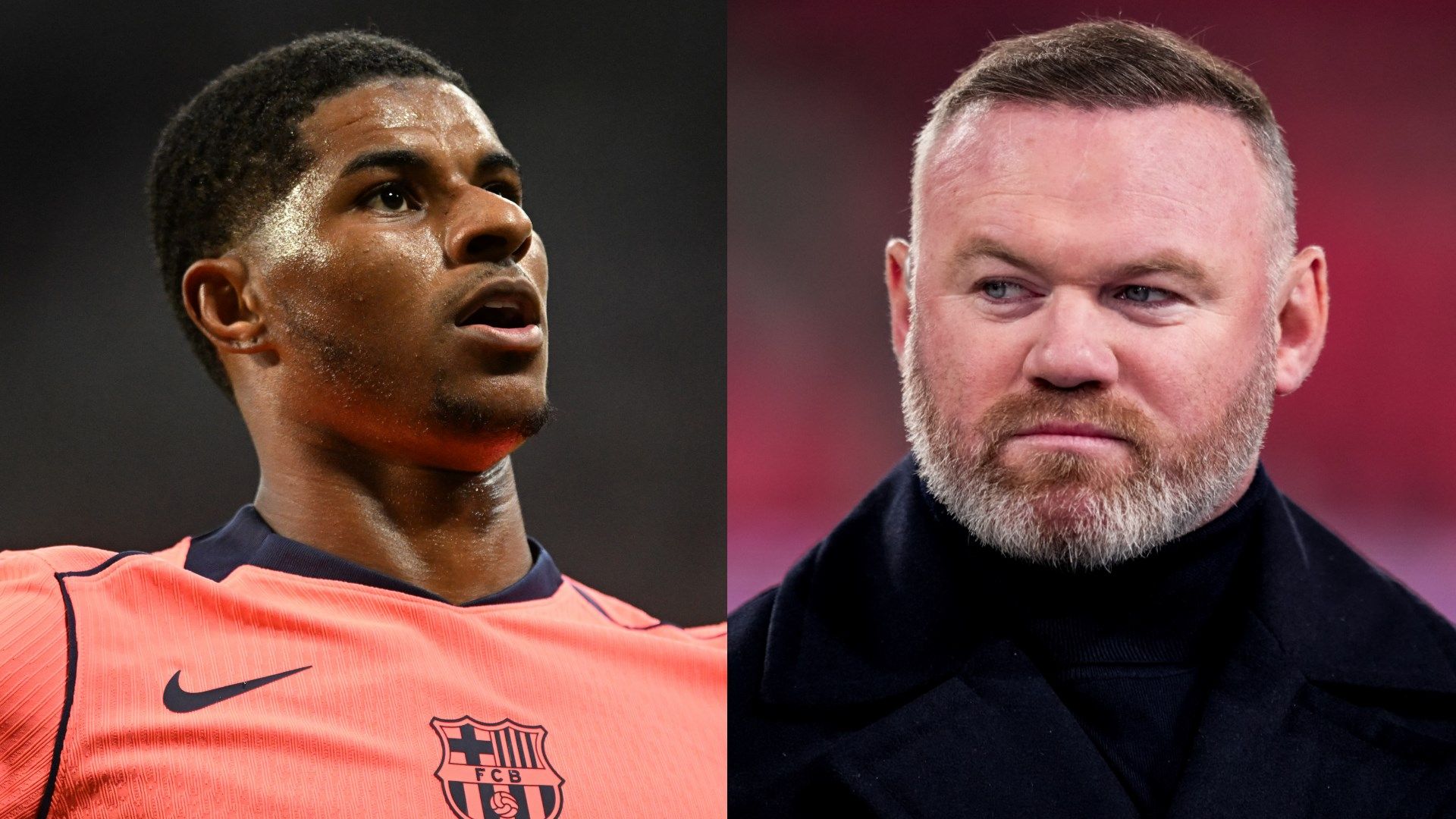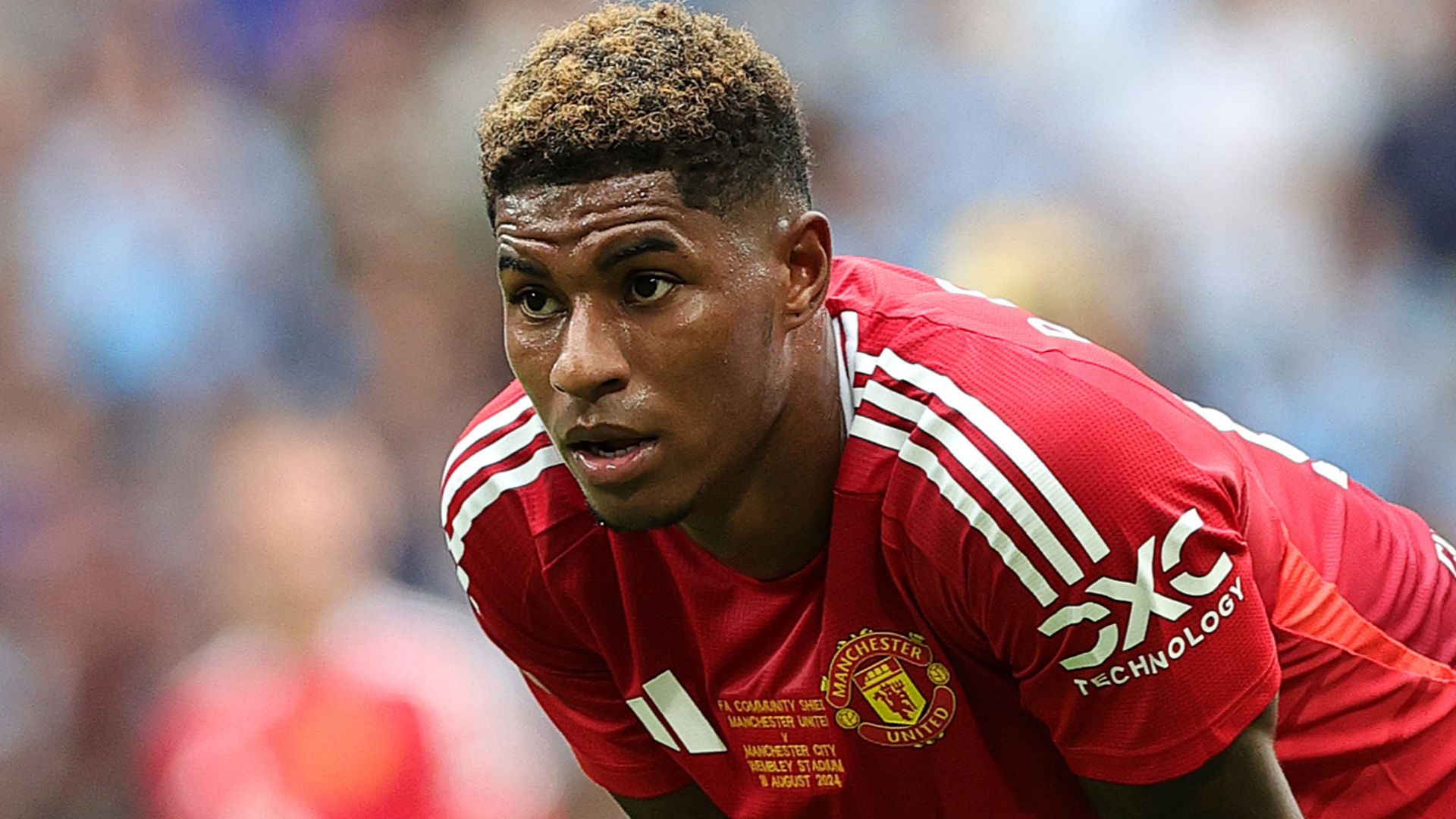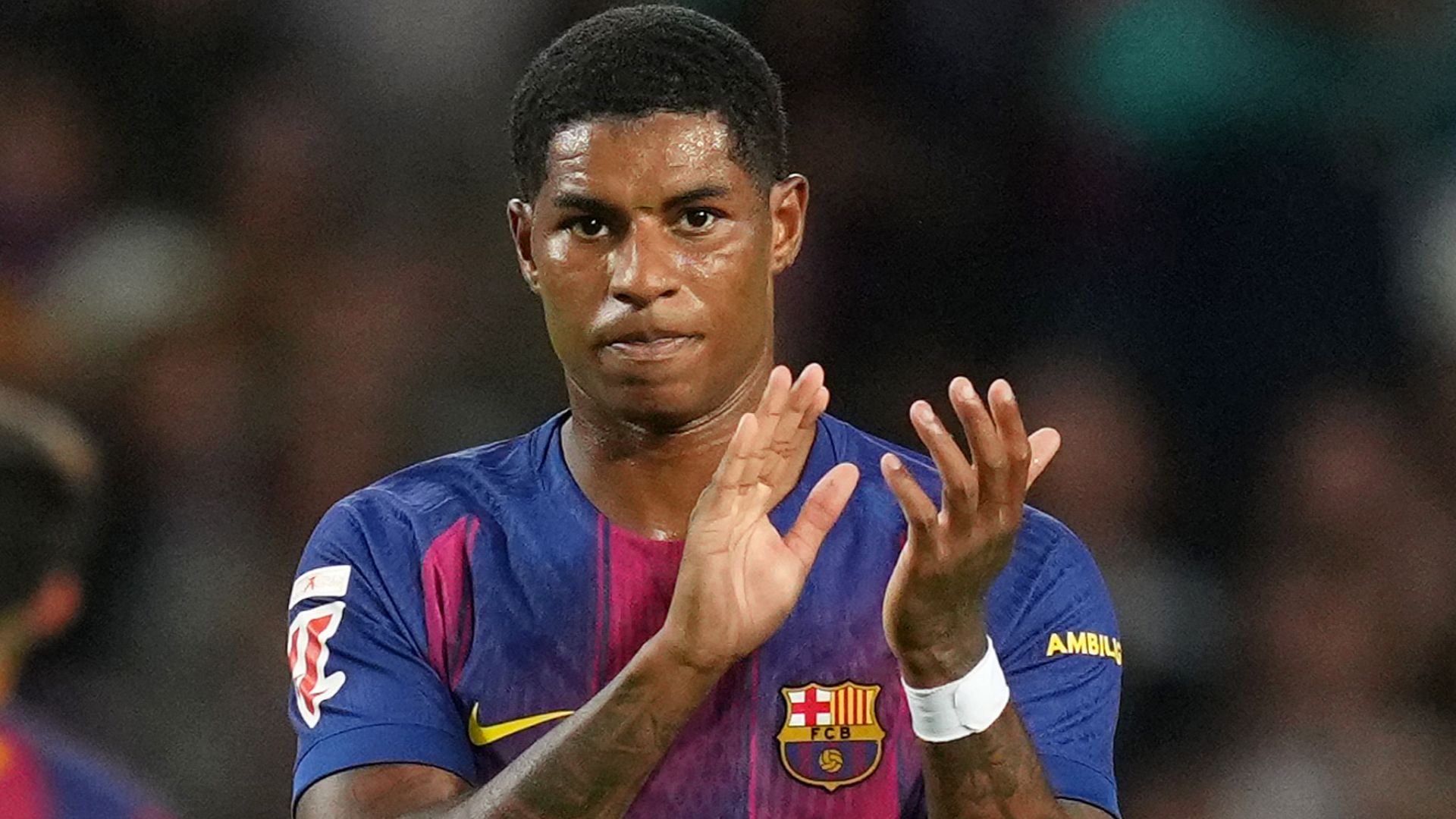Wayne Rooney Points Finger at Marcus Rashford Amid Man Utd Struggles and Barcelona Loan
Marcus Rashford, the English forward now on loan at Barcelona from Manchester United, has faced intense scrutiny over his career ups and downs. In a surprising twist, former United star Wayne Rooney attributes the club’s recent woes partly to Rashford’s own actions, especially after the player’s comments on an “inconsistent environment.”



Rashford’s Journey from Peak Performance to New Horizons at Barcelona
In the 2022-23 season, Rashford seemed to reclaim his peak abilities, delivering an outstanding 30 goals for Manchester United, which led to a highly rewarding contract extension. However, his status within the team gradually diminished, making it tough for the 27-year-old to secure consistent playing time under coach Ruben Amorim. As a result, he was sent on loan to Aston Villa for the latter part of the previous campaign, where he occasionally displayed hints of his earlier prowess, though no long-term agreement materialized.
Transition to La Liga and Emerging Success
This opening paved the way for the Spanish powerhouse Barcelona to acquire him during the summer transfer window. Since joining the Catalan club, known as the Blaugrana, Rashford has notched three goals and provided five assists, sparking discussions about the possibility of a permanent move to Spain that could solidify his future there.
Insights into Rashford’s Call for Stability and England Comeback
With his recent inclusion in the England squad under manager Thomas Tuchel, Rashford shared his thoughts during an ITV interview in the most recent international window. He explained the reasons behind his challenging periods at Manchester United, emphasizing that maintaining steady performance is crucial. “Consistency plays a huge role,” he noted, adding that operating in a fluctuating setting for years has made it tougher to stay reliable. Yet, he acknowledged the need to enhance his own consistency, aiming to perform at his highest level regularly rather than sporadically.
He further elaborated that achieving reliability in any field, beyond just athletics, requires stable elements in daily routines and training methods. Reflecting on the numerous shifts he’s encountered throughout his career, Rashford is now focused on addressing these issues to elevate his game and derive greater enjoyment from the sport when he’s operating at full capacity.
Expert Opinions: Rooney and Scholes on Personal Accountability
Although frequent coaching changes at Manchester United haven’t helped Rashford’s development, Wayne Rooney, a legendary figure from the club’s academy, argues that the player must take responsibility for his inconsistent output. As United’s top scorer of all time, Rooney expressed on his podcast, The Wayne Rooney Show, that while the team atmosphere may not have been ideal, players should look inward when they’re underperforming or benched. He suggested that excuses about the environment often stem from personal effort, pointing out instances in matches where Rashford could have shown more energy and involvement-factors independent of external conditions.
Rooney’s Candid Assessment
Rooney, who holds a positive view of Rashford personally, labeled this blame-shifting as a convenient narrative, insisting it boils down to how one commits to their role on the field.
Scholes Weighs in on Attitude and Potential
Likewise, club icon Paul Scholes has voiced concerns about Rashford’s behavior during his final days at Old Trafford. The former England player remarked that he finds it hard to support Rashford due to his apparent lack of commitment, describing his approach to the team as unacceptable. Scholes referenced multiple occasions where Rashford seemed disengaged, suggesting this attitude indicated a withdrawal from his duties at Manchester United.
Scholes believes that once a player disengages, it’s a pattern that might repeat, and despite Rashford’s undeniable skills that could place him among the elite globally, he questions whether the mental fortitude is there to match.
Rashford’s Legacy at Manchester United and Future Prospects
Having debuted for Manchester United in 2016, Rashford amassed 138 goals across 426 appearances and celebrated five significant titles. His contract with the club extends until 2028, but given the current dynamics, his long-term fit appears limited, with Barcelona now evaluating whether to exercise an option for a full transfer in 2026.
The Recent Controversy Surrounding Wayne Rooney’s Comments
Wayne Rooney, the legendary former captain of Manchester United and England, has stirred up significant discussion in the football world with his bold statements blaming Marcus Rashford for contributing to Manchester United’s decline. This criticism comes amid broader claims of an inconsistent environment at the club, highlighting how internal factors like player form, management decisions, and team culture can impact overall performance. As one of the most decorated players in Premier League history, Rooney’s insights offer a unique perspective on the challenges facing modern football teams like Manchester United.
At the core of Rooney’s remarks is the idea that Rashford’s inconsistent performances and off-field issues have exacerbated the club’s struggles since their dominant era under Sir Alex Ferguson. Manchester United’s decline has been a hot topic among fans and analysts, with the team failing to secure major titles consistently in recent years. Keywords like “Manchester United decline” often surface in discussions about fluctuating results, squad instability, and the pressure on key players like Rashford to deliver week in, week out.
Understanding Manchester United’s Struggles Under Inconsistent Environments
Manchester United’s environment has been described as inconsistent due to frequent managerial changes, injury woes, and varying levels of player commitment. Rooney’s comments point to Rashford as a symbol of these issues, suggesting that the young forward’s ups and downs-such as his goal droughts and public scrutiny over personal matters-mirror the broader instability at the club. This inconsistency in the environment can lead to erratic on-pitch results, affecting everything from match outcomes to fan morale.
For instance, Rashford’s role as a homegrown talent means his form is crucial for Manchester United’s identity, but factors like inconsistent training regimes or leadership gaps have reportedly hindered his progress. Football experts often link such environments to a lack of cohesive strategy, where players like Rashford might struggle to find their rhythm. This has fueled debates on how “inconsistent environment” plays a pivotal role in team dynamics, potentially derailing even the most talented squads.
Impact on Player Development and Team Performance
The blame game between veterans like Rooney and current stars like Rashford underscores the importance of consistency in football. When environments lack stability, players can experience mental and physical burnout, leading to subpar performances. In Rashford’s case, his potential as a top-tier forward has been evident in flashes, such as his hat-trick heroics in key matches, but lapses in form have coincided with Manchester United’s overall downturn.
This situation isn’t unique to Manchester United; inconsistent environments have plagued many clubs, affecting player morale and tactical execution. Bullet points below outline key ways this impacts teams:
- Reduced Focus and Motivation: Players in unstable settings often deal with distractions, from frequent coaching changes to internal conflicts, which can sap their drive and lead to errors on the field.
- Injury and Fatigue Risks: Without consistent training and recovery protocols, stars like Rashford face higher injury rates, as seen in his own history of setbacks, further compounding team woes.
- Eroded Team Cohesion: When key figures are inconsistent, it disrupts the group’s unity, making it harder to build the chemistry needed for success in high-stakes competitions like the Premier League.
Benefits of a Consistent Environment in Football Teams
A stable environment can be a game-changer for football clubs, offering numerous benefits that help prevent declines like the one Manchester United is experiencing. For players, consistency fosters better mental health, allowing them to focus on skill development rather than external pressures. Teams with strong, consistent leadership often see improved performance metrics, such as higher win rates and better youth integration.
In Rashford’s scenario, a more consistent setup could enhance his confidence and output, turning him into the reliable goal-scorer Manchester United needs. Benefits include:
- Enhanced Performance Longevity: Players thrive in routines that support physical and mental well-being, reducing the risk of burnouts and extending careers.
- Stronger Fan and Sponsor Relations: Clubs with consistent environments build trust, leading to loyal fanbases and lucrative partnerships, which stabilize finances during tough times.
- Better Tactical Adaptability: When the core environment is steady, teams can adapt strategies more effectively, as seen in clubs like Liverpool under Jurgen Klopp, where consistency has driven sustained success.
Practical Tips for Maintaining Consistency in Football
To address issues like those raised in Rooney’s critique, players, managers, and clubs can adopt practical tips to foster consistency. These strategies draw from real-world football scenarios and can help teams like Manchester United rebuild their environment.
- Establish Clear Communication Channels: Managers should hold regular team meetings to align on goals, as inconsistent messaging can lead to confusion-Rashford, for example, might benefit from more direct feedback to stabilize his role.
- Prioritize Mental Health Support: Introduce wellness programs, including sports psychologists, to help players like Rashford manage pressures and maintain focus amidst public scrutiny.
- Focus on Routine and Recovery: Implement structured training schedules with adequate rest periods, drawing from successful models like those at Manchester City, to minimize injuries and boost consistency.
Case Studies of Similar Football Scenarios
Looking at historical case studies provides valuable lessons on how inconsistent environments affect top teams. For example, Arsenal’s “Invincibles” era under Arsene Wenger showed how consistency in philosophy and squad building led to unprecedented success, contrasting with their later struggles due to internal changes. Similarly, Chelsea’s fluctuations under various managers illustrate how player inconsistencies, akin to Rashford’s, can accelerate a team’s decline if not addressed.
In Manchester United’s own history, the post-Ferguson era serves as a case study, where the loss of a consistent leadership figure contributed to declining performances, much like Rooney’s observations about current dynamics.
First-Hand Experiences from Football Legends
Drawing from first-hand experiences of football legends like Rooney himself, we can glean insights into handling inconsistent environments. Rooney has often shared in interviews how the structured environment under Ferguson helped him navigate early career pressures, suggesting that similar support could aid Rashford. Other legends, such as Gary Neville, have recounted how team consistency was key to Manchester United’s glory days, emphasizing the need for players to adapt and lead through challenging periods. These anecdotes highlight that personal accountability, combined with club-wide stability, is essential for overcoming declines and achieving long-term success.









